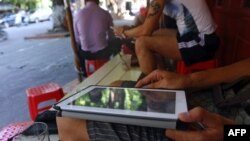Last year, Phuong Nghi bought herself a smartphone because her parents refused to get her one. And perhaps with reason: Nghi didn't think twice when she was recently asked how much time she spends watching videos on the device. "Eight hours," she said. Per day.
Nghi's parents worried she would become like millions of young Vietnamese who are addicted to electronics and the Internet.
"My mom was afraid I would use it too much, that it wouldn't be good for me," the pharmacy major told VOA, pulling out her white Samsung with a pink cat ornament.
Many other Vietnamese are turning to the Internet to watch videos, too. Nielsen, a consumer research company, released a report on Monday that said 91 percent of all online users in Vietnam log on to watch videos at least once a week. That put Vietnam at the top of a list that measured online viewing in six Southeast Asian countries.
Indonesia, the Philippines, and Thailand had percentages in the 80s, while Malaysia came in at 67 percent and Singapore at 56 percent.
Virtual multitaskers
Besides watching videos at a higher rate than other Southeast Asians, Vietnamese are also multitaskers. Nielsen surveyed "digital consumers" who had several devices, whether smartphones, computers, or smart TVs, and found that more than anyone else in the region, Vietnamese often use three gadgets simultaneously. Vietnam's three-screen usage rate is 84 percent. Nielsen said in a press release that this was part of a trend in Asia marked by the "growing consumption of online video content."
“Consumers are exercising their choice of how, when and where they can obtain their content and are more active in their media habits than ever before,” said Nancy Jaffe, Nielsen’s cross-platform leader in Southeast Asia.
Sourcing videos online adds an extra layer of controversy in Vietnam, a one-party system that limits access to Internet. That’s because sites like Youtube and Facebook allow people to upload clips beyond the reach of Hanoi censors. Not that this is foolproof. For instance, officials fined the creators of an online TV show called “Apartment 69.”
Controversial videos
Officials said the infraction was for not getting state permission to produce the series. But the show also centered around the sexual exploits of young Vietnamese.
At the same time, the Internet has been a boon to amateur and professional directors who make use of free platforms.
Huynh Nguyen Dang Khoa broke ground two years ago with his debut, “My Best Gay Friend,” seen as Vietnam’s first gay sitcom. The episodes on Youtube averaged roughly one million views each and brought global attention to the country’s gay rights movement.
Much of the increase in online video use follows the rise of smartphones and Internet penetration in Vietnam. The Nielsen report said in three years, access on smartphones has quadrupled here, while access on laptops has more than doubled.
As the survey was being released, Vietnam was going through yet another Internet slowdown all across the country. Most Vietnamese rely on one main cable to connect them to the virtual world, and that undersea wire can get damaged multiple times a year. The latest cable debacle, which remains unfixed as of this publishing, means millions will have to wait for their latest online shows.




